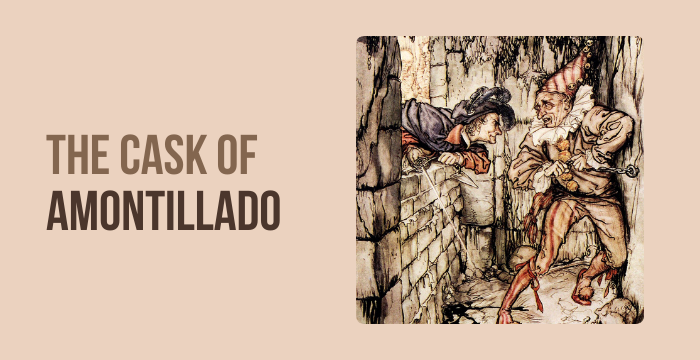
“The Cask of Amontillado” is written by the legendary writer “Edgar Allan Poe” and is a bone-chilling take showcasing revenge. As mentioned at the end of Poe’s life, different themes such as substance abuse, revenge, pride, delusion, freedom and remorse help create a bone-chilling story and provide insight into the author's mind.
1. Revenge
It is the first and primary theme of “The Cask of Amontillado”, which illustrates it as a revenge tale. The story starts with the line, “The thousand injuries of Fortunato I had borne as I best could, but when he ventured upon insult, I vowed revenge.” In the paragraphs below, the writer provides information on different factors he considers revenge. As per the writer, revenge refers to the process when the individual takes revenge without the fear of consequences, and the person suffering from the revenge is well about the individual bringing the revenge and the reason for revenge. The definition forms the plot of the story where the murderer, Montresor, plans the murder in a way that he will not be caught, and Fortunato will also be aware of Montresor's responsibility for their killing. In the story, a man comes face to face with Montresor, who helps calculate and keep a record of every insult done to him. The large number of insults and injuries done by Fortunato towards Montresor has made him obsessed with the feeling of revenge. However, Montresor never makes Fortunato feel any dislike. This is important as it is the plan of revenge. And gaining Fortunato's trust is an integral part of the plan. As a result, it becomes essential for Montresor to keep a friendly and happy face in front of Fortunato. What makes the story so chilling is that it highlights Montresor as a predetermined and unemotional murderer.
2. Delusion
The story of “The Cask of Amontillado” suffers from different types of delusion. Although Fortunato is not foolish, he does not even look evil by nature. Also, Montresor never provides information about any incident where he was upset with Fortunato. However, it may also be possible that Montreso may have had the delusion that he had been forcefully antagonised by Fortunato when he had not done anything. The character in the essay also leaves the delusion that murdering someone in revenge is a justified act in cases where insults were not intense, just more in several instances. What made the story chilling is that Montresor did not feel remorse for his crime, nor was he ever punished for the crime he committed. Even after becoming old, he claims his actions are correct.
On the other hand, Fortunato was living in his delusion that he was critical. As per Fortunato, he is very liked by others in society; however, people find him very irritating. The image of self-importance blinds Fortunato. The delusion was very helpful for Montresor to bring him to the Catacombs, where he murdered him to take his revenge. Fortunato was living in the delusion that he could trust Montreso as he was a friend, which resulted in him getting killed.
3. Substance Abuse
As per the story, the only addictive drug used in the story is alcohol. Alcohol addiction is an integral part of the theme. Montreso and Furtonato are both affected by different types of addiction. Montreso is affected by the addiction to taking revenge, and Fortunato is affected by the addiction to self-importance. The story's plot is based on the Carnival, when everyone is drunk and allowed to behave freely. Montreso used “Amontillado”, a rare brandy, to bring Fortunato. He kept making drinks for Fortunato to make him feel safe with Montreso. In this story, the character was not addicted to substance abuse, although it became the main object of vengeance. As per the story, the writer considers substance abuse to be an essential part of his own life.
4. Freedom
Freedom is an integral part of the story “The Cask of Amontillado. During the story, Monestry wants to be free from revenge, and the only way to get freedom is to kill Fortunato. On the other hand, Fortunato wants a small place at the bottom of the catacomb. However, what makes the story very interesting is the way Montreso murdered Fortunato. Montrso was motivated by taking Fortunato's freedom. On the other hand, Fortunato keeps insulting Montreso, which takes away Montreso's freedom of thought.
5. Remorse
Remorse is also a significant theme in the story “The Cask of Amontillado”, which, although complicated in the story. After killing Fortunato, Montreso starts feeling strangeness in himself; however, later, he calls it dampness. After 50 long years, when he narrated his acts, he did not feel any regret and did not apologise. This made the story very much disturbing for the listeners even after five years. Also, Montreso escaped without punishment, and the story shows the coldness. Monsters is so affected by the feelings of revenge that he does not consider the emotional impact of the killing. In the story, Fortunato does not get the chance to showcase their remorse. Montreso did not provide any evidence or reasons for his vengeance. Also, in the story, they are deluded into reflecting on thousands of minor insults. Moreover, both the characters involved in the story did not feel any type of remorse for their actions taken in the story due to different individual reasons. The theme used in “The Cask of Amontillado” helps reflect the author's thoughts and the way he considers remorse.
6. Pride
Pride as the main reason for revenge is also an important theme in “The Cask of Amontillado”. As per the story, Montreso has a feeling that his pride has been affected by Fortunato's insults. Although Montreso is not able to recall a particular event, he still has the feeling of hatred, which results in making him take revenge on Fortunato. The sense of superiority made him take extreme steps in the story. Fortunato was enjoying a different kind of pride which made him act destructive. The sense of self importance resulted in making him unaware about his status in the society.


